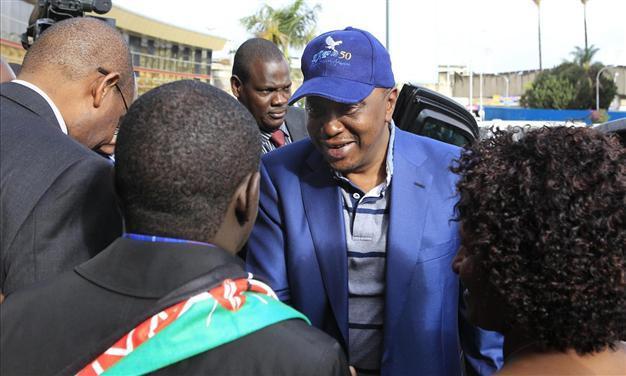Kenyan leader heads to International Criminal Court
NAIROBI - Agence France-Presse

Uhuru Kenyatta arrives at the Jomo Kenyatta International Airport as he departs to attend a hearing at the International Criminal Court at The Hague, in Nairobi, Oct. 7. REUTERS Photo
Kenyan President Uhuru Kenyatta headed to The Hague Oct. 7 for a landmark appearance before the International Criminal Court where he faces charges of crimes against humanity.Kenyatta, who will become the first sitting president to appear before the chamber, temporarily handed power to his deputy to "protect the sovereignty" of the east African country before taking a regular flight as a "private" citizen to Amsterdam.
He waved to supporters at the airport in Nairobi in a relatively low-key early morning departure - which included checking in alongside other travellers - accompanied by a small delegation including his wife and daughter, as well as six MPs and three ministers, an AFP reporter said.
He is due to attend a "status conference" hearing on Wednesday at The Hague-based ICC, after prosecutors asked for an indefinite delay until Nairobi handed over documents they believe could clinch their case.
Kenyatta, 52, faces five counts at the ICC over his alleged role in masterminding post-election violence in 2007 and 2008 that left 1,200 people dead and 600,000 displaced.
The Kenyan leader has appeared at the ICC before, but not since he was elected president in March 2013.
Bitter memories are still fresh from 2007, when elections escalated into ethnic conflict, for which Kenyatta and Deputy President William Ruto were charged with crimes against humanity. Both reject the charges.
On Oct. 6 Kenyatta told parliament he had taken the "unprecedented" move to temporarily hand over power to Ruto - whose trial at the ICC has already begun.
"Let it not be said that I am attending... as the president of Kenya," he told a special session of parliament as several lawmakers stamped their feet in support. "My conscience is clear, has been clear and will remain forever clear," Kenyatta added.
Kenya's newspapers backed his decision to travel to the ICC, pointing out that to defy international orders could have resulted in repercussions for the whole country.
"He saw the sense in abiding by the resolution of the trial judges, because doing anything to the contrary would have been disastrous for him and the country," the Daily Nation's editorial read Oct. 7.
"By choosing to play along, the president has demonstrated that he has nothing to hide," The Standard newspaper stated.
The African Union had previously called for the ICC cases to be withdrawn and transferred to Kenyan courts, accusing the ICC of targeting Africans.
Kenya's post-electoral unrest shattered the east African country's image as a beacon of regional stability in late 2007, when opposition chief Raila Odinga accused then president Mwai Kibaki of rigging his way back to power.
What began as political riots quickly turned into ethnic killings of Kenyatta's Kikuyu tribe, who in return launched reprisal attacks, plunging Kenya into its worst wave of unrest since independence in 1963.
Kenyatta and Ruto, rivals in 2007, ran together in 2013 elections for the presidency, beating Odinga by a narrow margin in largely peaceful polls.
Calls last month to indefinitely postpone Kenyatta's trial were met with both celebration and frustration by supporters and opponents, although many Kenyans appear to have resigned themselves to trying to move on past one of the country's darkest periods. "As victims, we want justice that we have been yearning for," said Maureen Opondo, spokeswoman for a community who were forced to flee their homes during the violence in the western Nyanza region.
Many believe the case against Kenyatta will soon collapse, with the Standard calling the process a "farce," but at the same time stressing that the "quest for justice must not be abandoned."
















